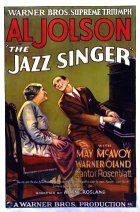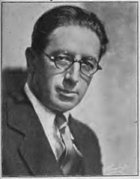
The Jazz Singer Page #8
- UNRATED
- Year:
- 1927
- 88 min
- 1,327 Views
INSERT TELEGRAM:
NEW YORK:
Miss Mary Dale
State-Lake Theater, Chicago, Ill.
Would you consider leading role new musical
show Fall opening, rehearsals begin two weeks.
Wire answer.
Harry Lee
Back to scene. Jack's face brightens as he finishes reading it. He hands
back the wire to Mary, saying:
TITLE 54:
"Gee, it's a great chance for you."Mary nods, smilingly telling Jack it's the opportunity she has been
working for, ever since she began her professional career. Jack pauses a
moment as realization begins to come to him that Mary's good fortune
means the end of the happiest period of his life. He puts out a hand and
congratulates her, then he adds falteringly:
TITLE 55:
"I'll be sorry ... in one way to see you go.I ... we ... we'll miss you a lot."
Mary smiles tenderly. She puts a hand on his arm affectionately. Jack
looks away as he says:
TITLE 56:
"I'll never forget that it is to you I oweeverything I am -- or ever will be."
Mary affects a light manner as she laughs and tells him to snap out of
the gloom. Jack pulls himself out of his sentimental mood to meet her
assumed gaiety. He asks her when she is leaving and she says after the
night performance the next day.
159.FULL SHOT ALONG DRESSING ROOMS
As Mary and Jack are talking, the door of another room opens and the
head of Buster Billings comes out. He sees Jack and shouts to him to
hurry up and get dressed. Jack, with another hesitating look at Mary
during which he seems desirous of saying something else, turns suddenly
and leaves her. She pauses a moment and looks after him. Then with a
smile, she enters her own room and closes the door.
NOTE:
Playing a romantic scene in blackface may be something of anexperiment and very likely an unsuccessful one. As an alternative,
should it not prove as effective as desired, there could be a scene
after No. 161 in Jack's dressing room, showing him enter in blackface
and start taking off the make-up.
160.INT. JACK'S ROOM
He enters, followed by Buster, who is urging him to get cleaned up and
dressed. Jack turns to the table, hesitates, and turns around to Buster.
161.CLOSE-UP BOTH
Jack tells him of Mary's good fortune. Buster nods understandingly as
though to convey that he always knew she would "make it." Buster looks
at Jack as though to read his thoughts. Then he puts an arm on Jack's
shoulder and says:
TITLE 57:
"Better forget it, kid. She's wrapped up in hercareer -- and you got a chance for Broadway
yourself if you keep up your present gait."
Jack nods and looks off into space. He slowly turns and reaches for the
can of cold cream.
FADE OUT:
FADE IN:
It is a general atmospheric shot showing the traffic on the boulevard
and the stately line of high buildings on the West Side.
163.MED. SHOT THEATER ENTRANCE
It is the entrance to a place like Orchestra Hall. There is a placard on
an easel in the center of the lobby.
164.CLOSE SHOT ENTRANCE
The lettering on the placard is as follows:
SPECIAL MATINEE:
LAST CHICAGO CONCERT
CANTOR ROSENBLATT
IN SACRED SONGS:
Popular Prices
165.MED. SHOT ENTRANCE
Among the people passing are Jack and Buster. Jack's eyes fall on the
placard and he stops. Buster stops and looks at Jack, who immediately
shifts his glance. He takes a quick look at his wristwatch.
166.CLOSE-UP JACK AND BUSTER
Jack tells Buster to go ahead adding:
TITLE 58:
"Forgot something. Run along and I'll meet youat the hotel."
Buster gives him a wise look, shrugs his shoulders, and starts ahead.
Jack turns as though to retrace his steps; then as he sees that Buster
has vanished he darts into the theater lobby.
167.MED. SHOT LOBBY
Jack dashes up to the box office, lays down a bill, takes a ticket in
return, and goes quickly to the entrance through which he disappears.
DISSOLVE INTO:
168.INT. THEATER FULL SHOT FROM CENTER
The place is filled with a fashionable throng and a generous sprinkling
of Jewish types, mostly the better, well-to-do Jews of both sexes. The
stage is set for concert. There is a small orchestra of string pieces
and a grand piano. A man of dignified appearance and dressed in stylish
afternoon clothes comes out of the wings and faces the audience.
169.CLOSE-UP MAN
He announces:
TITLE 59:
"The next and last number to be sung by CantorRosenblatt will be the famous song, 'Eli, Eli.'"
He bows and retires.
170.MED. SHOT STAGE
As the announcer retires, Cantor Rosenblatt appears and takes his
position. He turns to the orchestra leader who gives the signal for the
orchestra to play the introduction.
171.CLOSE-UP CANTOR
172.CLOSE SHOT AUDIENCE
In a small group sits Jack Robin. He is sitting up straight, his eyes
fixed on the cantor in an almost hypnotic stare.
173.MED. SHOT STAGE
Showing the cantor singing and the orchestra playing. (Other shots as
needed for Vitaphone purposes.)
174.CLOSE-UP JACK
He has slumped in his seat and he is listening intently, his eyes still
fixed on the singer.
175.REVERSE SHOT CANTOR
It is a fairly close shot of the singer alone as Jack would see him from
a seat well in front of the house. The figure slowly dissolves into the
figure of Jack's aged father, Cantor Rabinowitz.
176.CLOSE-UP JACK
His eyes are half closed as he visions his aged father singing in
Rosenblatt's place. He rubs a hand across his eyes slowly.
177.CLOSE-UP RABINOWITZ
The figure slowly dissolves into the real singer, Rosenblatt. In this
shot he finishes the song. He bows and starts to exit.
178.CLOSE SHOT SECTION AUDIENCE
They are applauding. Jack is still under the spell of the singing and
his thoughts. The people on either side of him get up and start out. He
is alone, slumped down in his seat, his eyes half closed again as the
FADE IN:
179.SYNAGOGUE ANTEROOM
There are about twenty Jewish boys in the room, much as they were in the
early part of the story. One of the boys, Moey, goes over to the
battered old piano, which, like other furniture of the room, is exactly
as it was ten years ago. Moey starts to play on the piano and the boys
quickly gather around him. They start to sing with him. (Vitaphone.)
180.CLOSE-UP MOEY
He is playing and singing "Yes, Sir, She's My Baby" with much gusto.
181.MED.SHOT GROUP
All of the boys are singing with him.
182.EXT. SYNAGOGUE
Cantor Rabinowitz, much more feeble than when we last saw him, is
approaching the door of the room in which the boys are singing. He
pauses as he hears the strains of unfamiliar -- and, to his ears,
profane -- music.
183.CLOSE-UP CANTOR
As he stops, his brow sets in a frown and his lips tighten. He throws
back his shoulders in a determined manner and starts for the door.
184.INT. ROOM MED. SHOT
The boys are still singing the popular song to Moey's jazzy
accompaniment.
The door opens and the cantor's rigid figure appears. One of the boys
jabs Moey in the back with a whispered alarm.
186.CLOSE-UP MOEY
As the other boy jabs him, Moey, with hardly a change in tempo, starts
playing and singing "Eli, Eli" with a very sanctimonious expression on
his face.
187.MED. SHOT BOYS
They, with Moey, are all singing "Eli, Eli."
The boys are singing the famous wailing song, as the cantor, standing in
the foreground, listens uncertainly.
189.CLOSE-UP CANTOR
He brushes a hand across his forehead in a perplexed manner. He is sure
that the music he heard from outside was not "Eli, Eli." Yet, he is
getting old and perhaps his ears are failing as well as his sight. Maybe
he has done the boys an injustice. His manner relaxes and he starts
toward the boys. (Vitaphone music is still going on.)
190.FULL SHOT ROOM
The cantor goes over to a side of the room, hangs up his battered old
derby hat, and puts on his familiar skullcap. One of the boys turns
around and, just as though discovering that the cantor has entered, he
tells Moey.
Moey gives an exclamation of surprise and stops playing suddenly.
(Vitaphone music stops.) The boys cease singing also and, with their
best synagogue manner, they start toward the cantor to extend the usual
salutation. Moey goes to the other side of the piano on which there is a
box. He picks up the box and goes toward the cantor.
192.MED. SHOT CANTOR
As Moey with the box goes up to him, the other boys fall in behind him.
The cantor looks at them in a surprised way, reaches in his pocket for
his glasses and puts them on, looks at Moey, and says: "Nu, what is
going on yet?" Moey hands the box in the direction of the cantor and
starts to say something.
Moey stammers a moment, then reaches in his pocket and, with the other
hand still holding out the box, he unfolds a wrinkled slip of paper with
the other, holds it up, and reads it:
TITLE 60:
"On the occasion of your sixtieth birthday,Cantor Rabinowitz, your loving choir boys wish
to present you this token, with best wishes for
your continued peace, prosperity, and
longevity."
Back to scene. Moey stammers over the last word and, with a sigh of
relief, drops the paper. The cantor looks puzzled, then a smile
illumines his face as he takes the box, saying:
TITLE 61:
"That was a nice speech, Moey -- I forgot itwas my birthday."
Translation
Translate and read this script in other languages:
Select another language:
- - Select -
- 简体中文 (Chinese - Simplified)
- 繁體中文 (Chinese - Traditional)
- Español (Spanish)
- Esperanto (Esperanto)
- 日本語 (Japanese)
- Português (Portuguese)
- Deutsch (German)
- العربية (Arabic)
- Français (French)
- Русский (Russian)
- ಕನ್ನಡ (Kannada)
- 한국어 (Korean)
- עברית (Hebrew)
- Gaeilge (Irish)
- Українська (Ukrainian)
- اردو (Urdu)
- Magyar (Hungarian)
- मानक हिन्दी (Hindi)
- Indonesia (Indonesian)
- Italiano (Italian)
- தமிழ் (Tamil)
- Türkçe (Turkish)
- తెలుగు (Telugu)
- ภาษาไทย (Thai)
- Tiếng Việt (Vietnamese)
- Čeština (Czech)
- Polski (Polish)
- Bahasa Indonesia (Indonesian)
- Românește (Romanian)
- Nederlands (Dutch)
- Ελληνικά (Greek)
- Latinum (Latin)
- Svenska (Swedish)
- Dansk (Danish)
- Suomi (Finnish)
- فارسی (Persian)
- ייִדיש (Yiddish)
- հայերեն (Armenian)
- Norsk (Norwegian)
- English (English)
Citation
Use the citation below to add this screenplay to your bibliography:
Style:MLAChicagoAPA
"The Jazz Singer" Scripts.com. STANDS4 LLC, 2025. Web. 24 Feb. 2025. <https://www.scripts.com/script/the_jazz_singer_878>.







Discuss this script with the community:
Report Comment
We're doing our best to make sure our content is useful, accurate and safe.
If by any chance you spot an inappropriate comment while navigating through our website please use this form to let us know, and we'll take care of it shortly.
Attachment
You need to be logged in to favorite.
Log In